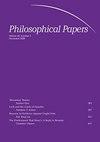数值实验
IF 1.3
3区 哲学
0 PHILOSOPHY
引用次数: 9
摘要
我认为,数值实验的计算模型构成了一种独特的新型科学方法,介于经验实验和分析理论之间。用科学仪器扩展我们的感官和用计算仪器扩展我们的数学能力之间也有相似之处。详细描述了这些方法在使用Metropolis算法的Ising模型中的具体应用。最后,有人认为,什么是可观察的,什么是可计算的,是双重偶然的,不是固定的,取决于当前的技术状态和世界的方式。本文章由计算机程序翻译,如有差异,请以英文原文为准。
Numerical Experimentation
I argue here that the computational models of numerical experimentation constitute a distinctively new kind of scientific method, intermediate in kind between empirical experimentation and analytic theory. A parallel is also drawn between extending our senses with scientific instruments and extending our mathematical powers by using computational instruments. A specific application of these methods to Ising Models using the Metropolis algorithm is described in detail. Finally, it is argued that what counts as observable, or what counts as computable, is doubly contingent and is not fixed, being dependent upon the current state of technology and the way the world is.
求助全文
通过发布文献求助,成功后即可免费获取论文全文。
去求助
来源期刊

Philosophical Papers
PHILOSOPHY-
CiteScore
2.10
自引率
0.00%
发文量
18
期刊介绍:
Philosophical Papers is an international, generalist journal of philosophy edited in South Africa Original Articles: Articles appearing in regular issues are original, high-quality, and stand-alone, and are written for the general professional philosopher. Submissions are welcome in any area of philosophy and undergo a process of peer review based on initial editor screening and refereeing by (usually) two referees. Special Issues: Topic-based special issues are comprised of both invited and submitted papers selected by guest editors. Recent special issues have included ''Philosophy''s Therapeutic Potential'' (2014, editor Dylan Futter); ''Aging and the Elderly'' (2012, editors Tom Martin and Samantha Vice); ''The Problem of the Criterion'' (2011, editor Mark Nelson); ''Retributive Emotions'' (2010, editor Lucy Allais); ‘Rape and its Meaning/s’ (2009, editor Louise du Toit). Calls for papers for upcoming special issues can be found here. Ideas for future special issues are welcome.
 求助内容:
求助内容: 应助结果提醒方式:
应助结果提醒方式:


